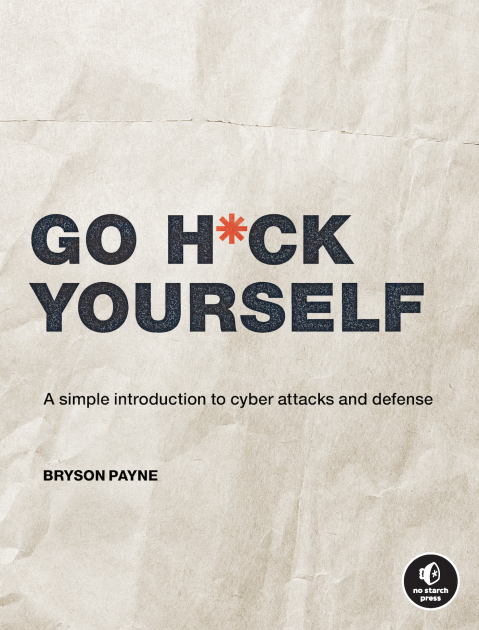We continue the Cybersecurity Awareness Month edition of our ongoing Author Spotlight series with Bryson Payne, PhD – author of Go H*ck Yourself: An Ethical Approach to Cyber Attacks and Defense (January 2022). In the following Q&A, we talk with him about training the next generation of cyber defenders, why there's never been a better time to get a job in infosec, the security benefits of thinking like an adversary, and whether ransomware could soon be coming for your car. (Spoiler alert: it's already here!)
Dr. Payne (@brysonpayne) holds the elite CISSP, GREM, GPEN, and CEH certifications, and is an award-winning cyber coach, author, TEDx speaker, and founding director of the Center for Cyber Operations Education at the University of North Georgia (an NSA-DHS Center for Academic Excellence in Cyber Defense). He's also a tenured professor of computer science at UNG, teaching aspiring coders and cyber professionals since 1998 – including coaching UNG’s champion NSA Codebreaker Challenge cyber ops team. His previous No Starch Press titles include the bestsellers Learn Java the Easy Way (2017) and Teach Your Kids to Code (2015).
No Starch Press: Cybersecurity Awareness Month is a great time to talk with you, because your career's been dedicated to making people aware of common and emerging security vulnerabilities. Recently though, high-profile hacks have hit the headlines like never before, with attacks on public utilities, government agencies, and customer databases causing real alarm among the general public. Are we starting to see a shift in the way mainstream society thinks about cybersecurity? If so, how can this be harnessed to make infosec stronger across the board?
Bryson Payne: All of us are seeing cyberattacks and breaches in the news, in the companies we do business with, and even in our own families. It’s a scary time to be so dependent upon technology, but there’s a bright side, yes –regular people are becoming smarter about how they use their devices, how they secure their information, and what information they share.
By understanding the threats that are out there, and how cybercriminals and cyberterrorists perform simple to complex attacks, you and I can protect ourselves and our families from cybercrime (or worse). And by training a new generation of cyber defenders, we can better protect our nation and our economy from future cyber threats.
NSP: You’re the founding director of the Center for Cyber Operations Education at UNG, where you’re also a tenured professor of computer science. So perhaps it’s no surprise that in 2018 UNG began offering a bachelor’s degree in cybersecurity – one of the nation’s first. Considering there are already a number of academic pathways that can lead to successful careers in the infosec world, what’s the benefit of pursuing such a specific major?
BP: The hands-on experience our students gain from real-world ethical hacking, forensics, network security, and reverse engineering in the classroom, in competitions, or in industry certifications, is more like what they’ll see in industry, government, and military cyber roles than traditional computer science or IT programs. In fact, the NSA and Department of Homeland Security are certifying more National Centers of Academic Excellence in Cyber Defense, like UNG, each year in order to give students the real-world skills needed to fight cybercrime, cyber terrorism, and even cyberwarfare for the next generation.
NSP: Does the addition of this degree program reflect a growing demand for cybersecurity pros in the workforce? And, for anyone reading this who’s considering going into the field (or going back to school to get credentialed), what are some of the career options you encourage students to explore?
BP: According to cyberseek.org, there are over 400,000 positions in cybersecurity open right now in the U.S. alone, with tens of thousands of new postings appearing every month. If you’re considering going into cyber, there’s never been a better time to get a certification, take a course, or study on your own.
If you like police dramas or mysteries, forensics could be a good fit. If you like taking things apart and (sometimes) putting them back together, reverse engineering or ethical hacking might be fun for you. If you like making sure everything works like it’s supposed to, you might make a great network operations or security operations center analyst. There’s a job for everyone, from trainers to managers to technicians – and the pay is growing faster than for many positions in non-security fields.
NSP: Studies have shown that at least half of college-age adults don’t pursue tech-related careers because they believe the subjects are too difficult to learn. What do you say to people who are interested in cybersecurity but don’t think they have what it takes?
BP: There are so many paths into cyber, whether you start out in psychology, journalism, international affairs, criminal justice, business, math, science, engineering, even health sciences. Cyber is a team sport, and we need people who understand not just the technology, but the people, processes, and even the cultures and languages involved in cybercrime, cyberattacks, and cyberwarfare. Every organization, from Fortune 500 companies to city governments, schools, and healthcare institutions, needs people like you and me thinking about cybersecurity and how to protect employees or customers.
But, while it's important to know that not every cyber job is a technical role, the more comfortable you are with the technology, the farther you can go.
NSP: Your upcoming book, Go H*ck Yourself, teaches readers how to perform just about every major type of attack, from stealing and cracking passwords, to launch phishing attacks, using social engineering tactics, and infecting devices with malware. Some critics might find it ironic that a champion of cyber defense would write a book that literally teaches people how to execute malicious hacks. Explain yourself!
BP: Just like in a martial arts class, you have to learn to kick and punch while you’re learning to block kicks and punches – you have to understand the offense to be able to defend yourself. By thinking like an adversary, you’ll see new ways to protect yourself, your company, your family, and the devices and systems you rely on in your daily life.
For too long we’ve been told what to do, but not why we need to do it. A great example is the password cracking you mentioned. When a reader sees how quickly and easily they can crack a one- or two-word password, even with numbers and symbols added to it, they finally have the mental tools to understand why we’re advocating for passphrases of four or five words. It’s the same with all the other attacks – once you see what a hacker can do, you understand how important good cyber hygiene is, and how small steps to secure your devices can really pay off.
NSP: One type of attack that's really skyrocketed lately is ransomware. Your home state of Georgia is just one example – city and county governments, state agencies, hospital systems, even local election systems have fallen victim to ransom demands. With hackers hammering away at our institutional weak spots, something as simple as not installing a security patch right away, or clicking on a link in a socially engineered email can usher in a potentially devastating attack. What do you think can be done to prevent the human errors arguably fueling the current ransomware rage?
BP: Ransomware is definitely one of the most serious threats to your business, your family, and your own financial security. But the good news is that you can keep yourself from being an easy target. While the news often refers to humans as the weakest link, I actually see us as the best first line of defense. Employees and leaders who can spot phishing emails, who install updates and patches regularly, and who use good cyber hygiene can block more than 99% of known attacks before they get into your organization! And smart security-minded computer users can also apply these practices at home to protect themselves and their loved ones from online adversaries on the prowl for easy vulnerabilities.
NSP: Along those same lines, a lot of organizations have started backing up their files as a failsafe. But hackers being hackers, they’ve already adapted: double-extortion ransomware is now the norm, where the data’s exfiltrated before it’s encrypted so it can be released online if the ransom is not paid. How bad is the problem, and what's the solution?
BP: Double-extortion malware can have the most devastating financial impact short of cyber-physical attacks (and by that I mean when malware takes over a manufacturing facility, critical infrastructure, or medical facility and causes real-world, physical damage to real equipment or even endangers human life). It's true that backups used to be enough to recover from ransomware without paying the ransom, but these double-extortion attacks can steal data for months before locking down systems and demanding payment.
The best defense, in addition to those backups, is having well-trained cyber professionals doing what we call "active threat hunting" – looking for suspicious activity, like small file transfers overnight or to unknown networks, and tracking down systems that show indicators of attack or compromise. That’s why it’s important that we train more cyber defenders. Every organization needs cyber heroes now, so it's the perfect time to develop these skills.
NSP: Dr. Payne, you have arrived at your final destination. (Well, my last question anyway.) Over the past decade you’ve done some very cool conference presentations on car hacking, and have since turned them into a tutorial on your blog. The cool factor aside, this is an increasingly relevant skill set for aspiring white hats – since 2016 there’s been a 94% year-over-year increase in automotive cybersecurity incidents, including remote attacks that can control your steering, pump your brakes, shut down the engine, unlock your doors, open the trunk, etc.
1) Is it only a matter of time before ransomware infects this realm of life, with people, say, unable to start their car until they pay a hacker? 2) In the future, should automakers be pentesting cars at the level they perform crash tests? 3) Does this keep you up at night, or are you optimistic that your UNG graduates will have a solution?
BP: It is only a matter of time before we see ransomware and similar attacks regularly affecting smart cars. Today’s automobiles can have more than 40 computer chips, dozens of systems, and networks and connections from USB to 5G, Wi-Fi, Bluetooth, GPS, satellite radio, and more. We call that the “attack surface” of a system, and with so many ways for hackers to try to get into your vehicle, we’ve actually already seen successful remote attacks in the wild – and we’ll continue to see new ones. The good news is that every make and model is slightly different, so a hack that works on a Honda might not work on a Ford, and vice versa.
That being said, auto manufacturers have a responsibility to secure the networks and computer systems inside your vehicle and mine from malicious hackers, which is why I happen to believe that teaching young people how to test and secure these systems – starting within a virtual environment like we do in the book – is one of the best ways to protect our vehicles and our personal safety from ransomware on the roadway.


